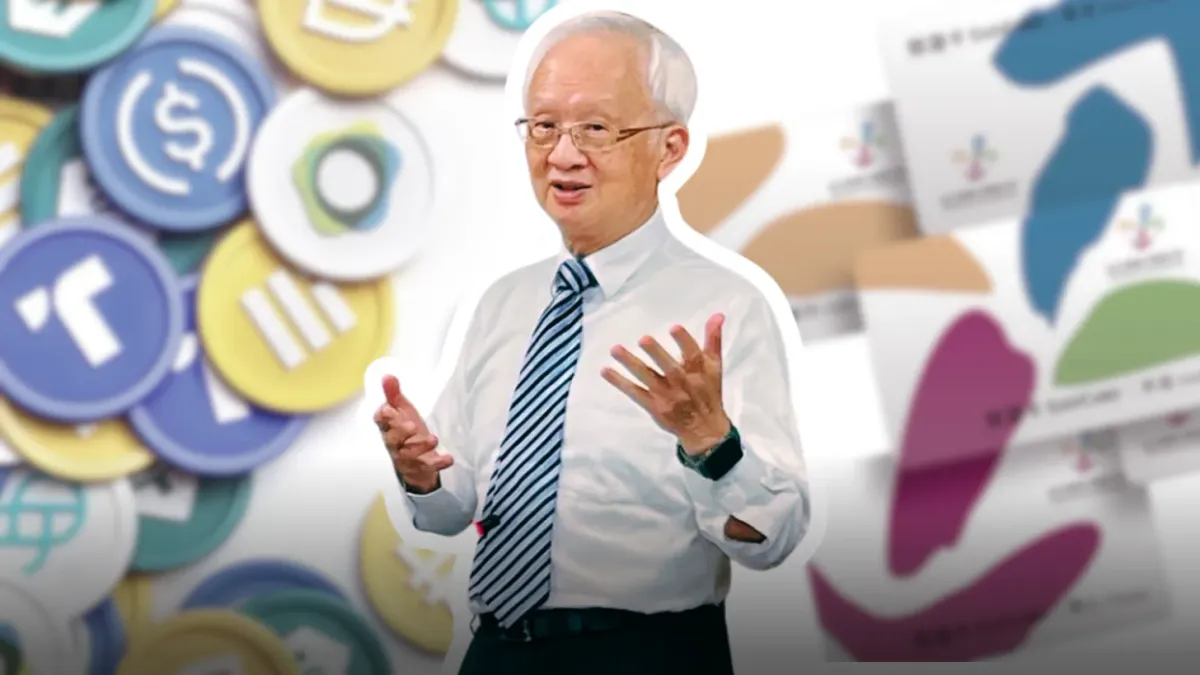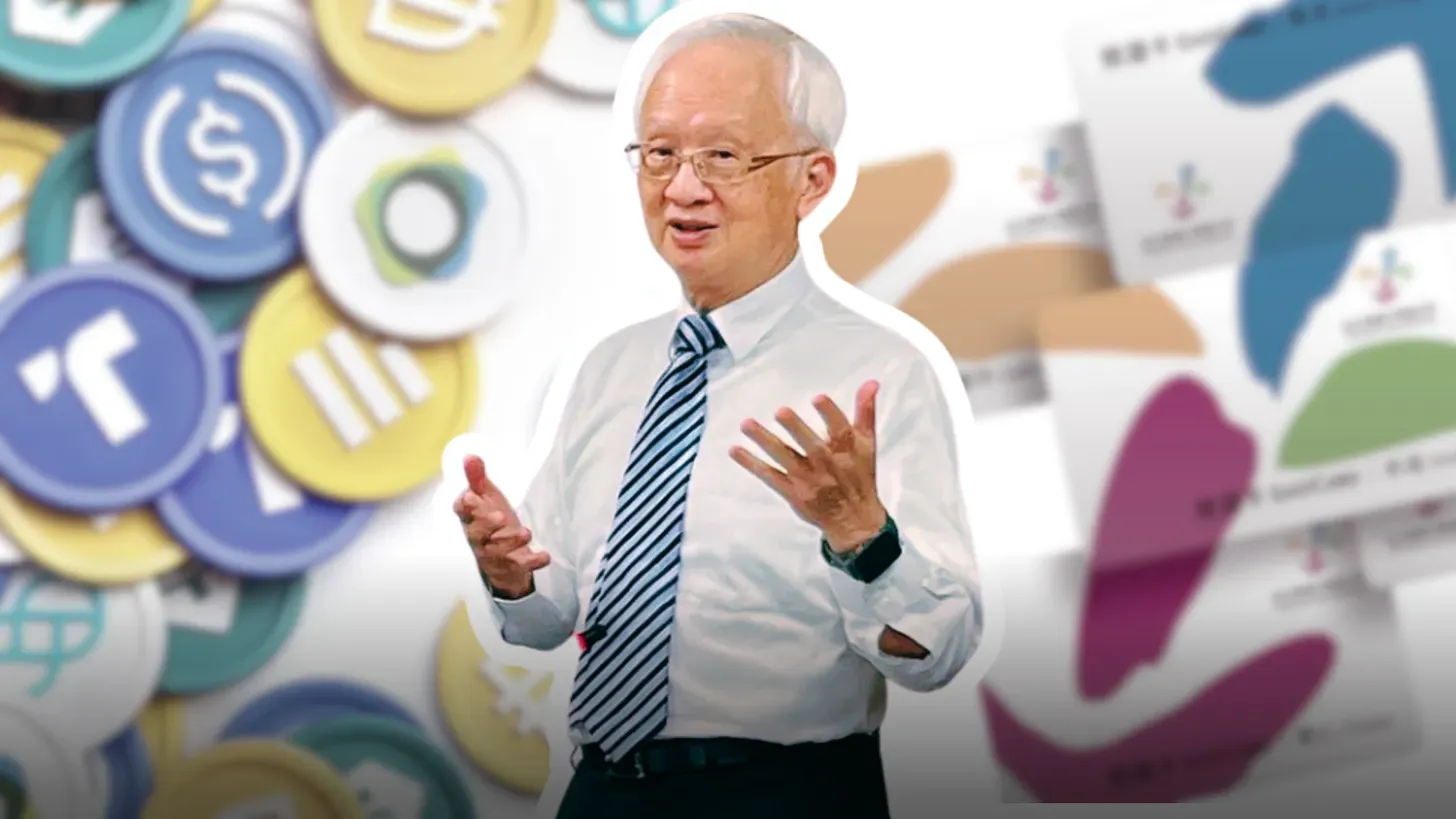An Open Letter to Chairman Jui-Bin Dong: EasyCard Is Not a Stablecoin — Here's the Key Difference

GM,
This article concerns the public interest. It is fully open and free to share.
This week, Mega Financial Holding Chairman Ruey-Bin Tung made headlines after commenting on stablecoins in an interview. He said: “Taiwan already had a TWD stablecoin back in 2002 — it’s the EasyCard that everyone carries.” He went on: “Many recent technologies and products are just flashy marketing. When you analyze their substance, they turn out to be gimmicks.” His remarks quickly sparked backlash and became the hottest controversy of the week.
The incident began during a visit by the Legislative Yuan's Finance Committee to Mega Financial Holding. During the session, Mr. Tung shared his views on stablecoins, which caught the attention of the media. In response, he held an informal press briefing, taking on the role of "Professor Tung" to explain his stance on stablecoins in more detail. The media’s strong interest in his remarks stems from Mr. Tung’s considerable influence in Taiwan’s financial sector.
A Triple-Crowned Figure in Finance
Mr. Ruey-Bin Tung currently serves not only as Chairman of Mega Financial Holding, but also as Chairman of the Bankers Association of the Republic of China and as a Board Member of the Central Bank — a trio of roles that makes him a “Triple Crown” figure in Taiwanese finance. He has also previously chaired the EasyCard Investment Holding Company and the Central Deposit Insurance Corporation, both of which are critical institutions in Taiwan’s financial system.

Mega International Commercial Bank is one of Taiwan’s eight major government-owned banks and the largest clearing bank for foreign exchange in the country. Simply put, when it comes to the smooth flow of U.S. dollars in and out of Taiwan, Mega Bank is the central hub. That also makes it a key player in any future development of stablecoins in Taiwan.
The Bankers Association of the Republic of China serves as the highest coordinating body for all banks in Taiwan. It manages policy alignment and self-regulation, functioning like a civilian counterpart to the Financial Supervisory Commission (FSC). Public statements by the association’s chairman are often regarded as representing the consensus of the entire banking industry — and they carry significant influence over financial policy.
As for the Board of Directors at Taiwan’s Central Bank, their role hardly needs further explanation. They set the country’s interest rates, foreign exchange strategies, and monetary policy. Whether the government ultimately chooses to crack down on or support stablecoin development, Ruey-Bin Tung will have a direct say in that decision.
Mr. Tung is the only person in Taiwan to currently hold all three positions simultaneously — Chairman of Mega Financial Holding, Chairman of the Bankers Association, and Central Bank Board Member. So, what exactly did he say about stablecoins? Although the media tea briefing wasn’t streamed online, mainstream outlets reported a consistent core message.
Mr. Tung’s views on stablecoins can be summarized in three main points:
- They benefit issuers but are unfair to users.
- They lack practical appeal and convenience.
- They are essentially no different from tools like EasyCard.
According to Mr. Tung, the reserve funds backing stablecoins are managed by the issuers. For example, an issuer might purchase U.S. Treasury bonds and earn interest, but holders of the stablecoin don’t receive any share of that yield. In this sense, consumers are effectively providing an “interest-free loan” to the issuer — without receiving any direct benefit.
He also pointed out that Taiwan’s existing financial infrastructure — including credit cards, ATMs, and online banking — is already highly convenient. There’s no need for yet another payment system based on stablecoins. Unlike credit cards, stablecoins don’t offer delayed payment options, and they’re less cash-convertible, often with added fees.
Moreover, Taiwan already launched a comparable system in 2002: the EasyCard. Like a “Taiwanese stablecoin,” the EasyCard is loaded with fiat currency, pays no interest, is used solely for payments, and must be backed by reserves held in trust. The only meaningful difference is in application scope — not in fundamental innovation.
Everything Mr. Tung said is factual — except for that last part.
The Openness of Stablecoins
The fundamental difference between the EasyCard and stablecoins lies in openness — which is also the most significant innovation brought about by blockchain (or Web3 applications).
The EasyCard operates on a closed platform. For a merchant to accept EasyCard payments, they must first apply to become an authorized partner through the EasyCard Corporation. Applicants need to be formally registered businesses and must submit a corporate bank account, financial statements, and on-site photos of their operations. The entire process takes about 12 weeks. Only after passing the review does EasyCard Corporation send staff to install payment terminals and provide training.
Additionally, the EasyCard Corporation recommends that the average transaction value stay below NT$200. Each individual payment may not exceed NT$1,000, and the daily spending cap per card is set at NT$3,000. Even if a merchant meets all these conditions, the application can still be denied at the company’s discretion. That’s why you’re unlikely to be able to use an EasyCard at an adult toy store.
In contrast, stablecoins function like digital cash — open and permissionless. Anyone can use them. It doesn’t matter who you are, what kind of business you run, or which country you’re in — as long as you have a wallet address, you can send and receive stablecoins directly, without needing approval from any central authority.
Once this concept of openness is understood, Mr. Tung’s three major concerns about stablecoins can be addressed with much more clarity.
Unfair to Users?
Mr. Tung argues that stablecoins are unfair to users because they don’t accrue interest. This perspective stems from the logic of the traditional financial system.
But for people living under unstable political or economic conditions, earning interest is hardly a top priority. In countries like Argentina, Turkey, and Venezuela — where national currencies experience severe devaluation — the greatest value of stablecoins lies in allowing ordinary people to convert their assets into dollar-denominated tokens to safeguard their hard-earned savings. In these regions, money stored in banks often earns no interest and might even vanish entirely during a financial crisis.
Perhaps Mr. Tung would counter that he was referring to users in Taiwan. But that doesn’t hold up either.
Although the U.S. GENIUS Act 1 explicitly prohibits stablecoin issuers from directly paying out interest, it does not forbid third parties from offering user incentives under different names. For example, Coinbase — closely integrated with USDC — currently offers several forms of yield. Users holding USDC in Coinbase's perpetual futures account can earn a 12% annual yield without trading at all. For those concerned about exchange risk, simply holding USDC in a Base Wallet (a self-custodial wallet) yields a 4.1% annual return. PayPal’s own stablecoin, PYUSD, has recently started offering a 4% APY 2, specifically to encourage merchants to hold it.
There are even more creative options among niche stablecoins. For instance, Lift Dollar, tailored for users in Latin America, automatically distributes 3.7% in U.S. Treasury yield back to holders on-chain. Another example is Glo Dollar, which doesn’t pay yield to users but donates the interest from U.S. Treasuries to support public goods in Web3 — with Blocktrend being one of its beneficiaries.
Rather than focusing solely on whether or not stablecoins pay interest, their greater significance lies in enabling third-party developers to build services on top of them.
Lack of Practical Appeal or Convenience?
Mr. Tung believes Taiwan's existing financial infrastructure is already convenient enough, so there’s no need for an additional, restricted payment tool. But this view shows a lack of understanding of decentralized finance (DeFi).
In the closed EasyCard ecosystem, everything must be approved by the company. Although merchants can receive payments via EasyCard, they can’t share profits with partners or create custom reward programs. At the end of the day, the EasyCard is just a prepaid card that facilitates payments — nothing more.
Stablecoins, in contrast, offer a major advantage: they’re programmable. You can write your own code to control how they’re used. Whenever I host a workshop and want to airdrop crypto to participants, I use smart contracts written by XY Finance to send funds to hundreds of attendees in a single transaction. How much does it cost? Less than NT$0.1 — and recipients get the funds instantly, no matter where they are in the world. Banks might claim, “We can do the same — we just haven’t yet.” But that’s the whole point — they haven’t. And that’s what makes all the difference.
Stablecoins allow innovation to be outsourced. Even if only 100 people in the world share the same needs as I do, someone out there will still write a smart contract to solve the problem. In contrast, if a traditional bank wants to develop a new feature using its engineering team, but the market isn’t large enough or profitable, shareholders will inevitably ask, “Why are you doing this? Isn’t there something more urgent to prioritize?”
See the difference? In a closed infrastructure, only banks have the authority to develop new features, so only the most widely demanded functions ever get implemented. But in the stablecoin ecosystem, anyone can be a developer — even the most niche needs can be met.
The longer one stays within the traditional system, the more constrained one becomes by its frameworks. Mr. Tung believes the most important thing is to serve the needs of the majority. In his view, Taiwan’s financial infrastructure is already well-developed, and those mainstream needs have long been addressed. Naturally, from that vantage point, he fails to see what’s innovative about stablecoins. But stablecoin advocates would argue that having abundant choices is what makes a system attractive, meeting a diverse range of life scenarios is what defines convenience — and that innovation often originates from the margins.
Moreover, according to Visa's statistics 3, the average stablecoin transaction over the past 12 months was $4,500 USD— roughly NT$130,000. That’s a sharp contrast to Visa’s average transaction amount of just $45 USD, not to mention EasyCard’s recommended NT$200 spending threshold. With such a stark difference in transaction size, how can stablecoins and EasyCards possibly serve the same purpose? I believe the reason Mr. Tung’s remarks sparked such backlash isn’t just because he misunderstood the situation, but because his statements could influence Taiwan’s future direction on stablecoins.
Nothing New Under the Sun
If the Taiwanese government concludes that stablecoins are essentially the same as EasyCards, the most immediate consequence would be a shift in regulatory direction. Stablecoin issuers would then be required to register as electronic payment institutions, and issuers, merchants, and users would all have to comply with the Act Governing Electronic Payment Institutions.
What’s the problem with that? The core of this regulation is the designated merchant review system. All transactions must be cleared through the Financial Information Service Co. (FISC), and any transaction disputes or identity verification issues would fall under the responsibility of the electronic payment institution. If this is strictly enforced, does it mean merchants must first apply for approval before accepting stablecoins? Should USDT and USDC transactions be cleared through FISC? Should Tether and Circle be held liable for scams in Taiwan or North Korean hacking groups?
This approach is completely incompatible with how stablecoins currently operate, and it's also why many crypto companies strongly oppose applying legacy financial regulations to this new asset class.
Former SEC Chair Gary Gensler famously claimed that there's "nothing new under the sun 4" when it comes to crypto, insisting that almost all cryptocurrencies are just securities in new packaging. This view aligns closely with Mr. Tung’s “just a gimmick” theory. The result? Startups fled. Not only did the local industry fail to grow, but the very people the regulators were trying to protect also left. Regulators, meanwhile, patted themselves on the back, believing they had restored order — the classic ostrich mentality.
Today, however, the U.S. has come to realize that new rules are needed to manage crypto assets, to retain both innovation and talent and become a global leader. Last week, current SEC Commissioner Paul Atkins announced the launch of Project Crypto, marking a complete 180-degree shift from his predecessor. The message was clear: crypto talent no longer needs to leave the U.S. to find work, doesn’t need to set up offshore companies to innovate, and doesn’t need to use a VPN just to claim airdrops.
Some online commenters were harsh in their criticism of Mr. Tung’s remarks, but I don’t believe we should rush to push him away. After all, he holds a crucial decision-making position in Taiwan’s financial sector, and scolding him won’t lead to meaningful change. Moreover, 95% of people in Taiwan still don’t own any cryptocurrency. As part of the 5% who do — and who have firsthand experience — we should understand that not everyone immediately sees the point of stablecoins. In Taiwan, if you instantly “get” crypto the first time you see it, you’re probably either living an extremely comfortable or extremely desperate life.
For most people, Taiwan’s financial system works just fine. But that doesn’t mean nothing needs to change. Recently, Coinbase even produced a two-minute musical commercial mocking the U.K. government’s conservative attitude, titled: “If everything is fine, don’t change anything.” Turns out, there are plenty of people around the world who think that way.
Mr. Tung is so deeply embedded in the inner workings of the traditional financial system that it becomes even harder for him to imagine what an open, decentralized financial world might look like. In his worldview, being able to send $100,000 USD across borders with a fee of under NT$3,000 is already considered a generous deal. But for those familiar with crypto, even a gas fee under NT$1 feels too expensive. Let alone expecting him to evaluate the legality of decentralized financial services that don’t go through any formal vetting process. Before we can even begin to discuss whether Taiwan needs stablecoins, people like Mr. Tung Ruei-Bin need to learn to unlearn.




